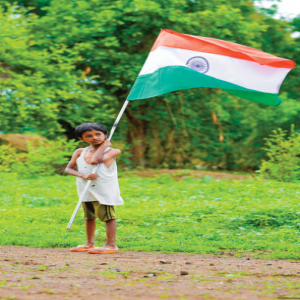

As India prepares to mark the 79th anniversary of her Independence on August 15, we pause to honour and revere the countless freedom fighters who made titanic sacrifices in the long and arduous struggle to break free from the yoke of colonial subjugation. Their courage, conviction, and endurance in the face of tyranny bequeathed to us the gift of political freedom—a gift that remains both priceless and fragile.
Yet, it would be both naïve and historically short-sighted to believe that the struggle for freedom culminated in 1947 with the lowering of the Union Jack and the transfer of power. The quest for freedom is not a finite event; it is a perpetual endeavour. Freedom, much like Schrödinger's cat in its paradoxical box, teeters between presence and absence—it exists, yet remains elusive if left unwatched.
It is a delicate inheritance, one that can be imperceptibly eroded when we succumb to the distractions of materialism and the seductions of self-interest. Tyranny is rarely extinguished; more often, it lies in wait, ready to return under new guises. Therefore, vigilance is not optional—it is the price we must pay to preserve our liberty.
For Mahatma Gandhi, Swaraj was never merely the substitution of British rulers with Indian ones. It was not the destination but the beginning of a deeper, more personal revolution. At its core, Swaraj represented self-rule—not just politically, but spiritually and morally. It was about reclaiming personal autonomy through self-respect, restraint, and moral clarity.
Gandhi called upon every Indian to liberate the mind from both external domination and internal enslavement, and to undertake the demanding journey of character formation. "True Ahimsa," he once said, "should mean complete freedom from ill-will, anger, and hatred—and an overwhelming love for all."
Measured against the ideals of the freedom we inherited, the cracks in our democracy are painfully visible. How can a society beset with endemic corruption, divisive politics rooted in caste, creed, and region, persecution of minorities, and a dismal record on free speech and ex
The recent acquittals in the Malegaon and Mumbai train blast cases have left victims' families shattered, robbed of justice and closure. Such outcomes not only reflect systemic failure but reveal the deep rot of political interference and institutional apathy that continues to corrode our democracy.
Can we then, in good conscience, call ourselves a free nation?
The answer may depend on whom you ask. For the poor, the marginalised, the tribal communities, and religious minorities, the promise of freedom remains largely unfulfilled. The recent ordeal faced by two nuns in Chhattisgarh—harassed and threatened simply for who they were—laid bare the disturbing reality that even the basic freedom of movement is not assured to all citizens. In such an environment, we are advised not to proclaim our religious identity, but to conceal it, if we wish to travel without hindrance. What kind of freedom is this?
True freedom cannot be passive; it must be actively safeguarded, earned anew with each generation. It is not an entitlement, but a responsibility—one that calls us to rise above the narrow confines of self-interest, consumerism, and the insidious "I-Me-Myself" mentality.
Let this Independence Day be not only a celebration of past glories, but a call to renewed vigilance, moral clarity, and collective responsibility. The spirit of 1947 must not be embalmed in nostalgia; it must be rekindled, lived, and defended—every single day.